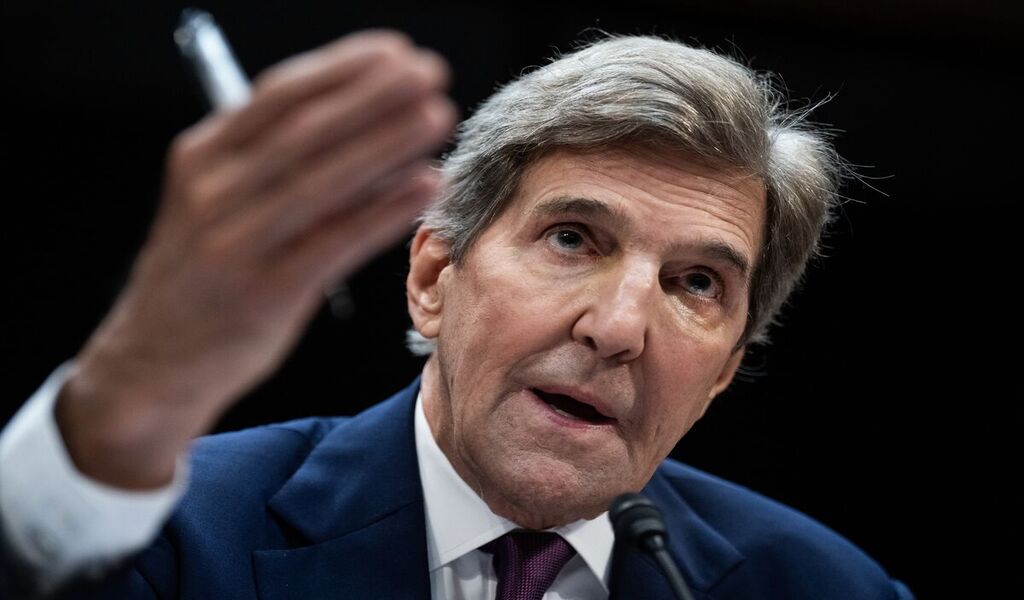(CTN NEWS) – This week, the United States and China will seek to rejuvenate their endeavors in addressing the issue of global warming.
These bilateral meetings are anticipated to elevate the level of ambition in tackling climate change, a crucial step preceding the UN-sponsored climate talks scheduled for late 2023.
These discussions come on the heels of two previous significant visits by high-ranking US officials to China this year.
Both countries, being the largest contributors to greenhouse gas emissions, are striving to stabilize their relationship, which has been strained by trade disputes, military tensions, and allegations of espionage.
US Climate Envoy John Kerry Holds Talks in Beijing to Address Climate Challenges and Bilateral Concerns
On Sunday, John Kerry, the US special envoy on climate change, landed in Beijing for a series of discussions with his Chinese counterpart, Xie Zhenhua.
The meetings are scheduled to take place from Monday through Wednesday and will concentrate on various topics such as the reduction of methane emissions, the limitation of coal usage, the mitigation of deforestation, and the provision of assistance to developing nations in dealing with climate change.
Having fostered a warm relationship through more than two decades of diplomatic engagement, Kerry and Xie are expected to delve into China’s concerns regarding US tariffs and other trade restrictions on the import of Chinese solar panel and battery components, according to observers.
The US government is aiming to safeguard American manufacturers from inexpensive rivals in China, even those suspected of employing forced labor, a claim that Beijing refutes.
David Sandalow, the director of the US-China program at the Center on Global Energy Policy, expressed his expectations for the meetings, stating, “I don’t anticipate any major breakthroughs during these discussions, but my hope is that they can restore a sense of normalcy and diplomatic alignment.”
During a House foreign relations subcommittee hearing on Thursday, Kerry outlined his objectives for the trip to China, emphasizing the goal of establishing stability in the relationship without making any concessions.
Republicans Criticize Biden Administration’s Climate Diplomacy Approach Toward Beijing
Republicans have leveled criticism against the Biden administration, accusing it of adopting a lenient stance towards Beijing in climate diplomacy.
They argue that while China’s greenhouse gas emissions continue to rise, the United States is burdened with costly measures to address environmental concerns.
John Kerry becomes the third high-ranking US official, following Secretary of State Antony Blinken and Treasury Secretary Janet Yellen, to embark on a visit to China this year, in an effort to restore a stable bilateral relationship.
Both nations assert that despite their other disagreements, they should be able to collaborate effectively on climate change.
Li Shuo, representing Greenpeace in Beijing, highlighted the significance of the scheduled talks, stating that climate change remains a pivotal issue in the most crucial bilateral relationship in the world.
US-China Tensions Impact Climate Negotiations and Bilateral Relations
Previous discussions between the United States and China have proven influential in advancing global climate negotiations, such as the pivotal role they played in establishing the groundwork for the Paris climate accord in 2015.
During those talks, governments reached an agreement to restrict the increase in global temperatures to 1.5 degrees Celsius above pre-industrial levels.
However, tensions on broader issues have strained the relationship between the two countries in recent years. This includes the imposition of tariffs on Chinese products, including solar panels, during the Trump administration.
Other factors include the visit of former US House Speaker Nancy Pelosi to Taiwan last year and the enactment of a US law prohibiting imports of goods from China’s Xinjiang region due to concerns of forced labor practices.
These developments have added a chill to the overall bilateral dynamics.
Following Nancy Pelosi’s visit to Taiwan in August, an island governed by a democratic system but claimed by China as its territory, Beijing declared a halt to all climate change discussions with Washington.
The resumption of informal climate talks between the two nations only occurred in November during the COP27 summit held in Egypt.
Tensions have further escalated due to the comprehensive Inflation Reduction Act passed by the United States.
This legislation includes tax credits aimed at promoting domestic clean energy production to counter China’s dominance in the sector and revive manufacturing within the US.
These measures have contributed to an increase in friction between the two countries.
While China has made significant progress in renewable energy deployment, surpassing the combined efforts of the rest of the world, it has also witnessed a significant resurgence in coal usage, which has become a major concern for Washington.
China’s Increasing Number of Coal Plant Permits Raises Concerns
In 2022, China granted the highest number of new permits for coal plants since 2015, as reported by the Centre for Research on Energy and Clean Air (CREA) and the Global Energy Monitor (GEM).
Alden Meyer, a Senior Associate at the E3G think tank and an experienced observer of climate negotiations, expressed that although the US intends to address the cessation of new coal generation, it is improbable that China will provide any assurances on this matter.
Meyer also mentioned that China is expected to raise concerns about US tariffs imposed on Chinese solar technology, but it is unlikely that the US will announce any modifications to these trade restrictions.
In her recent visit, Janet Yellen made a public effort to encourage China’s participation in UN-managed funds aimed at supporting developing nations in combating climate change.
However, China, considering itself a developing nation, has been hesitant to engage in such initiatives.
Fang Li, the China director at the World Resources Institute, anticipates that the United States will also urge China to enhance its national climate commitment within the framework of the Paris agreement.
Nevertheless, the Chinese side may display reluctance due to its dissatisfaction with US trade barriers.
RELATED CTN NEWS:
Google Doodle Honors Renowned Artist Zarina Hashmi On Her 86th Birthday
OPEC Member Countries Achieve Record Revenue Of $873.6 Billion In 2022 From Oil Exports






